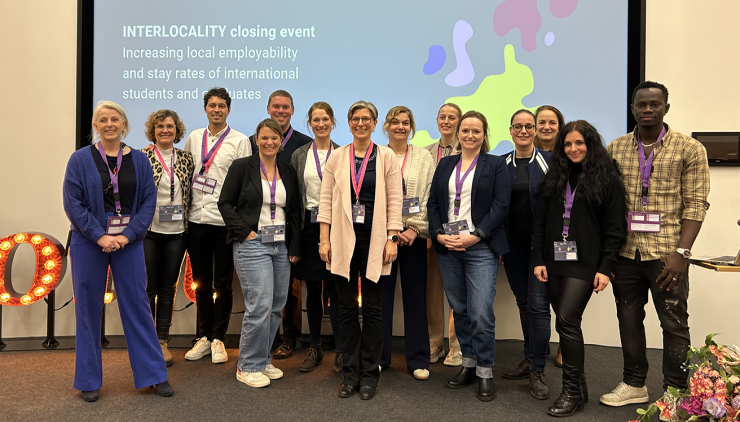-
8 januari
-
Internationalisering
-
Talentgericht
Project INTERLOCALITY: 'Helping international students into the local labor market'

What is the goal of the INTERLOCALITY research project?
Luc: 'By conducting research and initiating change, we want to increase the local employability of international engineering and business students. That is, we want to improve their chances of finding a suitable job in the region where they studied. By 'we' I mean not only Fontys but also other European colleges, universities, companies and intermediary organizations.
Why is this necessary?
Marian: 'The labor market shortage is huge, especially in the Brainport region where some 50,000 additional employees will be needed in the next ten years in engineering and IT alone. International students are a very interesting target group. They have already 'landed' in the region. It would be nice to keep them here. Many of these students also come here with that intention. The Dutch quality of education and the technological developments in companies attract them. Yet they run into obstacles, often causing them to leave again for their home countries.'
What are those obstacles?
Marian: 'In SME companies, the working language is usually Dutch, while many international students are not fluent in that language. Also: they don't know any employers and therefore have trouble finding a suitable job. Or they experience cultural differences once they work at a Dutch company.'
Luc: 'Peripheral issues, such as the shortage on the housing market and strict rules from the government, also work against them. This is not only the case in the Netherlands, by the way. Our research shows that international students in other European countries encounter the same obstacles.'
Were there any differences between the countries?
Marian: 'It is striking that, a number of years ago, Denmark did what the Netherlands is now also planning to do: significantly reduce the number of English-language education programs. That had a great impact on the inflow of international students and thus on the labor market. In Germany, the number is actually increasing.'
Luc: “So politics influences the situation, especially the inflow of international students. Just like the media. Because of them it sometimes seems like we are drowning in international students, while in the Netherlands in the academic year 2022-2023, only 7.7 percent of hbo students were international. The majority of international students study at a university.'
Why is Fontys taking part in INTERLOCALITY?
Marian: 'At Fontys, we want to contribute to a sustainable and inclusive society. Over 30 percent of the Dutch population has a migration background. The workforce of companies should reflect that. This is not yet the case. Moreover, our region has a strong international orientation. As an educational institution, we have a contribution to make. After all, we prepare the upcoming young professional for the labor market and we have contacts with their future employers.
Luc: 'It is also true that people with different cultural backgrounds bring different perspectives. Many employers appreciate that, according to our research among SMEs.'
So what has the research project yielded?
Marian: 'Our focus is on making the international student more employable. But young professionals are also strongly focused on their fellow students. So we discovered that it is also very important to involve local students: how can we strengthen their willingness to help international students? This is where higher education institutions and universities can play a role.
Luc: 'Besides information and knowledge you may use as an educational institution, government or company to strengthen your policy, all kinds of supporting tools have also been developed. For example, there are online training modules for employees of educational institutions, governments and other organizations. In these, they learn how to better guide international students in their steps on the local labor market. I also developed a game where you go through the journey of an international student. Again, with the goal of creating awareness and knowledge and starting the conversation.
How does the project connect to Talent-Oriented Education?
Luc: “Education is changing within Fontys: from Talent-Oriented Education we more and more work with big themes and with learning outcomes. It would be good if intercultural sensitivity were interwoven into those learning outcomes. After all, this is an essential skill of every professional we send into the work field. That is why it is important that it is embedded in the curriculum, as it is, for example, a skill like doing research.'
Recently an INTERLOCALITY event took place at Fontys. How do you look back on that?
Marian: 'In front of an international audience, we showed in a number of sessions what the research project entailed and delivered. The attendees went home inspired, and new contacts were made. What I'm very proud of is that on that day we and a number of educational institutions in the South region said: we have to take up this subject further together. An important seed was planted there.
